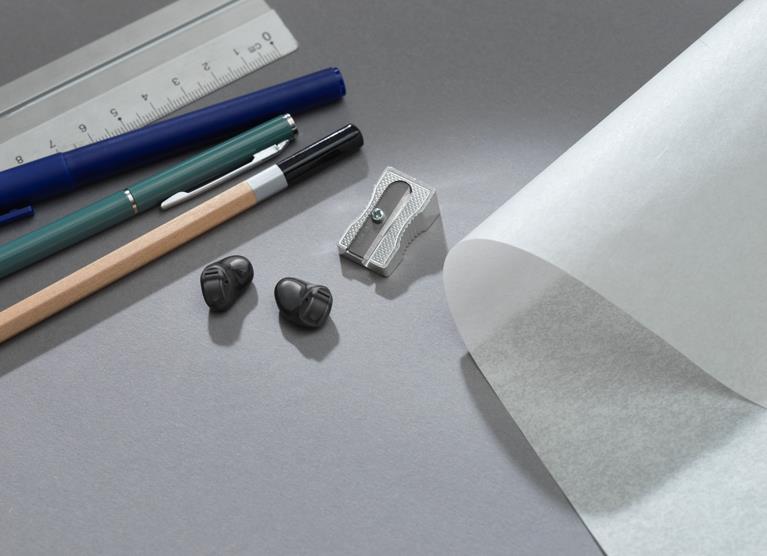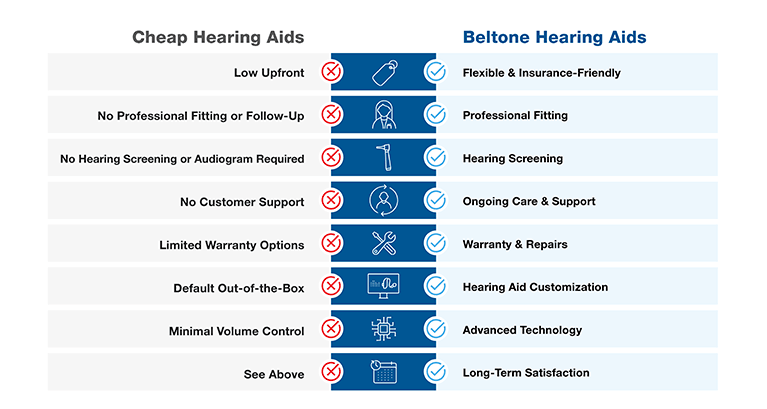The Myth of “Cheap Hearing Aids”: What You’re Really Paying For
With the rising cost of health care, many people are looking for ways to save—even on investments as important as hearing aids.
If you’ve been searching for “cheap hearing aids,” you’re not alone. You may have seen ads promising devices for $100, $50, or even less. It sounds like a dream deal, right?
But here’s the truth: cheap hearing aids are often a myth. While they may technically amplify sound, these devices rarely deliver the comprehensive hearing care that most people truly need. And worse, they can cost you more in the long run—both financially and in terms of your quality of life.
In this post, we’re breaking down the difference between “cheap” and valuable hearing solutions and why good hearing care providers are committed to providing affordable hearing aids that work—without cutting corners on care.

What Are “Cheap Hearing Aids,” Exactly?
The term “cheap hearing aids” typically refers to over-the-counter (OTC) hearing devices or personal sound amplification products (PSAPs). These products are often sold online or in retail stores and are marketed as budget-friendly alternatives to traditional hearing aids.
But what’s often left out of the pitch is just how limited these devices really are.
Common Features of Cheap Hearing Aids:
- No hearing screening or hearing assessment required
- Generic one-size-fits-all design
- Minimal volume control
- Limited amplification range
- Limited customer support
- No professional fitting or follow-up care
While these products might technically boost sound, they aren’t designed to be customized to address specific types or degrees of hearing loss—and they certainly don’t include the expert care that leads to long-term success with hearing treatment.

What You’re Not Getting With Cheap Hearing Aids
Let’s talk about what matters most in hearing care: you. Your hearing needs are as unique as your fingerprint. What works for one person may be ineffective—or even harmful—for another.
Here’s what you miss out on when you choose a so-called “cheap” solution:
1. No Professional Hearing Evaluation
A professional hearing evaluation is the cornerstone of effective hearing care. Without it, you’re essentially guessing—and that can lead to further hearing strain, poor comprehension, or underwhelming results.
2. No Custom Fit or Personalization
Hearing aids aren’t just about volume; they also need to address clarity, comfort, performance in noise and adapt to your environment. Prescriptive hearing aids are customized to your hearing profile, your ear’s unique shape and your unique hearing needs. Cheap devices? They’re built for the masses and not tailored for you.
3. No Ongoing Support
Hearing loss treatment is a journey and your needs may change over time. Your hearing treatment purchase should include cleanings, checkups, and device adjustments. With cheap hearing aids, once you buy the device, you’re usually on your own.
4. No Advanced Features
Modern hearing aids are equipped with cutting-edge features like:
- Background noise reduction
- Directional microphones – another way to help in noisy situations
- Bluetooth streaming so you can hear TV, music, podcasts, phone calls directly through your hearing aids
- Feedback cancellation – no more unwanted squealing
- Rechargeable options
These are features you simply won’t find in bargain-bin hearing devices.
5. Shorter Lifespan and Reliability Risks
Cheap devices often use low-grade materials and offer limited durability. Professionally fit hearing aids, on the other hand, are designed to last, with proven performance, durability and reliable support for years to come.
“Cheap” Can End Up Costing You More
It’s tempting to save money upfront—but the hidden costs of cheap hearing aids can add up quickly:
Wasted money on devices that can’t meet your needs.
Frustration and fatigue from poor sound quality.
Social withdrawal and isolation due to ineffective hearing support.
No repair or replacement support when things go wrong.
Delayed prescriptive treatment, which can lead to worsening hearing strugglesover time.
We believe in value—not shortcuts. That means providing technology and care to support better hearing, better communication, and better living.
Affordable Hearing Aids That Aren’t “Cheap”
So, what if you do need a budget-friendly solution?
That’s where your local hearing care professional comes in. We offer a variety of affordable hearing aid options that deliver the benefits of professional care and premium technology—without the sticker shock.
What Makes Affordable (As Opposed to "Cheap") Hearing Aids Different?
- Free hearing screenings* with licensed hearing care professionals
- Discreet styles, including miniRIE and microRIE form factors
- Flexible payment plans and insurance support
- Trusted brand name with years of hearing care experience
Good hearing care providers won’t promise $49 hearing aids—but they will promise long-term value, personalized care, and peace of mind.
💡 Did you know? Studies show that individuals who work with a hearing care professional are significantly more satisfied with their hearing aids than those who purchase them without support.

How to Make the Right Choice
Before investing in hearing devices—any hearing devices—ask these questions:
- Has my hearing been professionally tested?
- Will this device match the shape of my ear and the nature of my hearing loss?
- What happens if I need help or adjustments?
- Will this device improve my quality of life, or just make things louder?
If you're unsure how to answer, we’re here to help.
Let’s Talk
If you’re feeling overwhelmed by ads and endless options, start with a free hearing screening* at your local Beltone. You’ll meet with a trained hearing care professional who can walk you through your hearing screening results, recommend effective solutions, and help you find hearing aids that work for you—your lifestyle, your budget, and your goals.

Take Online Hearing Test
Take our free at-home hearing loss test as a first step on your journey to better hearing.

Book Your Free Appointment

Reviewed By
MJ DeSousa; B.Sc.(H), M.Cl.Sc, Aud(C)
MJ DeSousa is an Audiologist and Director of Patient Experience at Beltone, with over 35 years of experience in hearing health care. She earned her Masters of Clinical Science in Audiology from Western University in London, Ontario and has extensive experience as a practicing Audiologist and in corporate leadership within the hearing industry. At Beltone, DeSousa is dedicated to educating hearing care professionals across North America, ensuring they provide the highest standard of patient care. Learn more by visiting her LinkedIn here.

